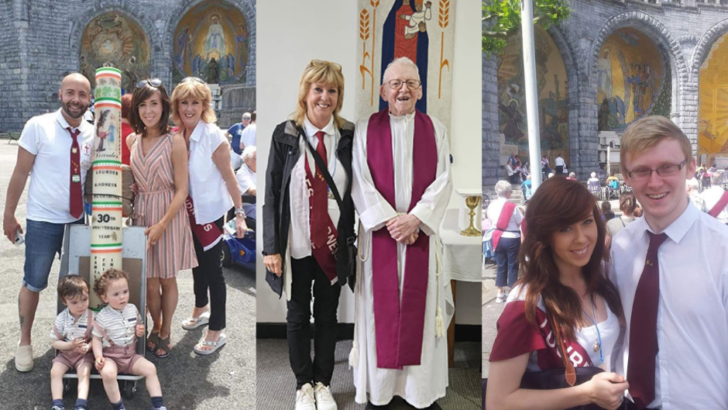Saint Bernadette Special
Many miracles are attributed to St Bernadette and the Shrine in Lourdes. People travel to Lourdes from all around the world to be cured from all sorts of illnesses. Ireland has a long connection with the French town, dating back to the 1880s, when the first English-speaking pilgrimage was organised.
Terry Clarke, director for The Lourdes Kindness charity told The Irish Catholic people go to Lourdes for many reasons, she believes St Bernadette and the shrine have such strong energy that they will attract even those with no faith at all.
“Many people come to Lourdes and don’t have faith, or they are from a different faith. But you can’t help but feel it when you get to Lourdes.” Ms Clarke said, adding that even if some pilgrims don’t believe in everything that happened in 1858, “it did happen, so whether they believe it or not, they feel it.”
Impact
Ms Clarke’s story with Lourdes and St Bernadette goes back over 35 years. Her husband Peadar Clarke was in a wheelchair and cured on May 7, 1989 during a pilgrimage to Lourdes. Ms and Mr Clarke were also struggling to have children, and after trying for ten years, only a miracle would be able to make that a reality.
During that first pilgrimage, a priest came to them and said, “something would happen between February 11-18 of the following year,” to what she replied “Oh my God, that’s nine months. I can’t take any more miracles.” Marie-Bernadette Checkmodine-Chatoua was born in the following February, being a result of the second Clarke Family’s miracle.
These miracles changed the family forever. Since then, they go to Lourdes multiple times every year. They founded the Lourdes Kindness Pilgrimage, which is an annual pilgrimage paid by fundraise throughout the year.
The organisation takes “people who wouldn’t be able to afford to go to Lourdes. We take them from all settings, and we sometimes have children with us. We help fund their parents to bring them down, they’d be very sick children.” They also take people from hospitals, nursing homes and hospices.
Ms Checkmodine-Chatoua and her brother had a unique upbringing compared to other children. They grew-up in between Dublin and Lourdes, as Mr Clarke started to work for a travel agency after being cured, and the family would go on numerous pilgrimages to Lourdes themselves.
Even their games would include St Bernadette, that was how inserted the saint was in their lives. “I would always pretend to be Bernadette, and I’d make my friends be Holy Mary. She was always in my mind,” Ms Checkmodine-Chatoua mentioned.
I love these parts of her, and I try to emulate those parts. Her humility and her strength of character, her defiance”
For her, carrying the name of Bernadette growing up just felt natural, as if she knew the saint personally. Which in a sense she did. She told this paper she was in the presence of St Bernadette’s relics before: “It is an absolute privilege to be in a room with them, and let alone to have actually held the monstrance holding the relics in my hand.”
“But it’s the [saint’s] human qualities that always drew me to her,” Ms Checkmodine-Chatoua said. Sharing her name with the saint means a lot to her, as it carries “Bernadette’s message, who she was, her character.”
“I love these parts of her, and I try to emulate those parts. Her humility and her strength of character, her defiance. [She was a] 14-year-old girl having the strength of character to withstand.”
St Bernadette was tested many times, she was brought before the police and priests, but she was standing to what she saw. She “had to stay true to her word and which she did…I think in many ways that’s probably what has always helped me with my own faith. I’m Catholic, I was born Catholic. But I’m also just 34, any time I wavered, not so much from my faith, but from the Church. It was her and her integrity that gave me strength to keep my faith going.”
For Ms Checkmodine-Chatoua, it is important to learn to separate one’s faith and the Church. She recalls growing up and finding herself questioning the Church. Talking to friends who stepped away from the Catholic faith and reading about Church scandals made her sceptical, but her faith was never shaken.
“I always had that [link to St Bernadette and to Lourdes] to come back to, [I] have my faith to support me and guide me. So, it’s been a real source of comfort and resilience in my own life. Personally, that’s what it would means to me. Resilience.”
This resilience and unshakable faith are characteristics that run through generations in the Clarke family. Ms Checkmodine-Chatoua has 7-year-old twins, who are being raised as practicing Catholics. “We talk about Jesus every day, we talk about Our Lady every day, we talk about St Bernadette every day.”
Challenges
The twins are studying in an ‘educate together school’, as she wants to raise them having as much respect for other people’s religions as possible. However, Ms Checkmodine-Chatoua never anticipated the children would face faith challenges so young.
One day, the boys came back from school and one of them said “so and so doesn’t believe in God, mammy.” She then explained that “some people don’t believe in God. What’s important is what you believe, and you know we can respect that they don’t believe. I hope that they would respect what you believe.”
The boy said he was “feeling upside down” with the fact that some people don’t believe in God, as the family is very religious and that was the first time they encountered a situation where they had such a conversation.
Ms Checkmodine-Chatoua said the boy stated laughing, what she questioned, and he said “I actually don’t really feel upside down about it. I kind of feel happy. Because just wait till we all go to heaven and they all see God there.” She told this paper in that moment she saw “pure faith”.
“It’s a challenge because I’m having those kind of conversations with them earlier than I thought. I mean, I had questions about my faith and the Church when I was 14/15, but he was 6. They’re already being challenged in their faith and they’re coming to their own understandings.”
She is transmitting to her twins the same sense of faith she had growing up. “Growing up with St Bernadette was reflected in the people I met. I grew up going to this place where people just purely loved each other, and purely wanted to help each other for no other reason than knowing it’s right.”
Ms Checkmodine-Chatoua believes that many people go to Lourdes not looking for a cure, but looking for acceptance, for comfort.
Growing up, she would invite some friends to do the pilgrimage. Some of these friends were LBGTQ+, “struggling to come to terms with who they are as a person and trying to balance that with their faith and the teachings of the Church.” These friends would come back to Ireland with their faith renewed.
She believes that sometimes, people would leave the Church not because they don’t have faith anymore, but because they don’t feel welcome or feel judged for who they are. “I believe that the Church needs to do more to accept and welcome all believers in Christ, as Christ himself asked us to do,” Ms Checkmodine-Chatoua said.
Young people should not feel they need to choose between who they are or their integrity as good people in society, and their belief in God”
“Young people in the Irish society today, thankfully have the freedom to be themselves in whatever way God made them, and many of whom still feel cast aside by the Church’s outdated teachings, but whose Christian beliefs and actions often outweigh those being shown by Church representatives and teachings in our communities.”
“As a contemporary Irish Catholic family and a charity organisation, we believe in Christ’s message of acceptance and complete love for one another, and this means inclusion,” she explained.
“Young people should not feel they need to choose between who they are or their integrity as good people in society, and their belief in God – and I think this is what Lourdes offers to any young person at a crossroads in their faith: they can experience pure Christianity in action, and not in theory or any outdated, man-made dogma.”
Meaning
These actions are the kindness and love people show to one another. Pushing wheelchairs, caring for strangers, supporting and accepting each other in prayer. Ms Clarke believes these actions give people a sense of adrenaline, of excitement, and that St Bernadette’s relics will bring to Ireland a similar feeling.
The relics coming to Ireland is an opportunity for the youth to find their way back to the Church, Ms Clarke said. As the young people would bring their elderly parents to see St Bernadette’s relics and feel the energy of faith.
Our Lady needed that strong character”
She particularly believes the coming of the relics will “excite some of the younger people” in their 30s and 40s who have been to Lourdes as children, with their schools or parents but fell out of faith, not faith in God, but faith in the Church.
Fr Liam V. Scanlan, spiritual director of Lourdes Kindness Pilgrimage and leader of the next pilgrimage in 2025 said that Bernadette’s “selection by Mary was perfect. Our Lady needed a special person, not well-known, not well-educated, but someone who would carry Her message right through to the parish priest and carry it through to the end.
“Our Lady needed that strong character, even as she was at 14, to be able to face up to the various authorities, Church and locals.”
Legacy
Fr Scanlan believes “young people today should be impressed by the strength of character of Bernadette and the visit of her relics will mean that St Bernadette’s story will be shared and spread among young people. This in turn will give them plenty to think about”.
St Bernadette seems to keep the Clarke Family close to her. Ms Clarke hosts students who are in Ireland for a few months to study or work. Coincidently, one of the students who is living with her is a descendant of the saint. The girl told Ms Clarke she does not believe and has no faith, but Ms Clarke plans on bringing the student to Lourdes anyway, “she is a beautiful person inside and out. I’m going to say, ‘come on, you’ve got to come down, this is your ancestor.’”
“I couldn’t believe it when she said it to me and she gave me her family name. When I put it in, Soubirous family it came straight up. She’s a descendant on her mother’s side of the family of St Bernadette.
“What are the chances of her coming to live in my house with the history that I have with Lourdes, things happen, don’t they? They happen for a reason.”


 Renata Steffens
Renata Steffens In the first photo is Terry Clarke and Marie-Bernadette with her husband (who she met in Lourdes) and twins, Romain and Mathéo who were born in 2017. In the middle photo is Terry Clark and Fr Liam V. Scanlan. And in the third is Marie-Bernadette with her brother Luke about 12 years ago.
In the first photo is Terry Clarke and Marie-Bernadette with her husband (who she met in Lourdes) and twins, Romain and Mathéo who were born in 2017. In the middle photo is Terry Clark and Fr Liam V. Scanlan. And in the third is Marie-Bernadette with her brother Luke about 12 years ago. 